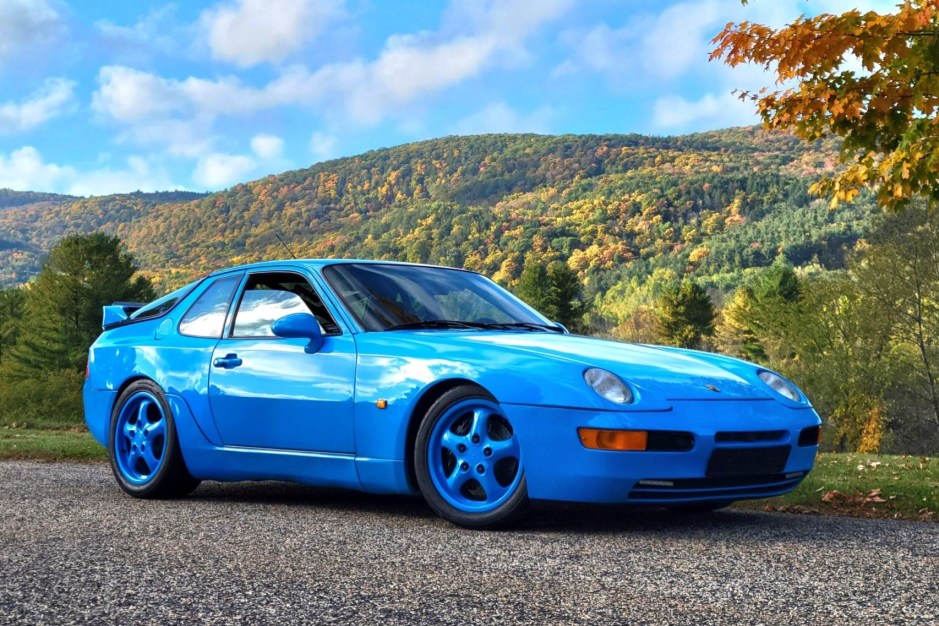



















Description
This 1995 Porsche 968 Club Sport is one of approximately 1,900 units built over a three-year production run and is a German-market example that spent time in the UK and Sweden before being imported to the US in 2023. The car is finished in Riviera Blue and wears a Deutsch Nine carbon-fiber rear wing as well as body-color 17″ Cup wheels. It rides on Leda adjustable coilovers with Eibach springs and has been fitted with M030-spec disc brakes…
This 1995 Porsche 968 Club Sport is one of approximately 1,900 units built over a three-year production run and is a German-market example that spent time in the UK and Sweden before being imported to the US in 2023. The car is finished in Riviera Blue and wears a Deutsch Nine carbon-fiber rear wing as well as body-color 17″ Cup wheels. It rides on Leda adjustable coilovers with Eibach springs and has been fitted with M030-spec disc brakes as well as adjustable front camber plates and Tarett Engineering sway bars. Sparco fixed-back bucket seats and multi-point harnesses have been added inside along with an OMP steering wheel and a Wiechers Sport roll cage. Power is provided by a 3.0-liter inline-four, while gear changes are through a short shifter linked to a six-speed manual transaxle. Further equipment includes a limited-slip differential, an aftermarket exhaust system, and air conditioning.
The Club Sport was a track-oriented variant of the 968 that was offered outside the US from late 1992 through 1995. This example left the factory finished in Riviera Blue with an optional sunroof. A panel was fitted in place of the factory sunroof opening prior to the roof and passenger-side door being repainted under previous ownership. A Deutsch Nine rear wing with an adjustable carbon-fiber center section has been added out back, and further details include pop-up headlights, fender-mounted turn indicators, and a 968 CS decklid badge.
Body-color 17″ Cup wheels were mounted with 225/45 front and 255/40 rear Hankook Ventus tires in July 2024. Adjustable Leda coilovers with Eibach springs have been added at all four corners, and helper springs are equipped out back. Further suspension modifications include Elephant Racing adjustable front camber plates, Tarett Engineering sway bars, and Racer’s Edge bushings and strut bearings. Stopping power is provided by M030-spec calipers over cross-drilled rotors. Stainless-steel brake lines have been added, and the rotors, pads, and front wheel bearings were replaced in preparation for the sale.
The cabin has been fitted with a Wiechers roll cage, and the factory Recaro seats have been replaced with Sparco Evo L units paired with multi-point harnesses. An electrical-system kill switch has been installed in place of the removed stereo, and retained factory equipment includes air conditioning, a digital clock, and a power passenger-side window.
The Alcantara-wrapped OMP steering wheel is mounted to a quick-release hub and paired with a short shifter. VDO instrumentation consists of a tachometer with a 6,600-rpm redline accompanied by a 300-km/h speedometer and gauges for coolant temperature, fuel level, oil pressure, and voltage. The six-digit odometer shows 140k kilometers (~87k miles).
A strut tower brace spans the engine bay, which houses a 3.0-liter inline-four equipped with VarioCam variable valve timing. Factory-rated output was 237 horsepower and 225 lb-ft of torque, and the selling dealer states that an aftermarket exhaust system and an RS Barn chip have been added. The oil pan gasket was replaced in 2023 along with the fuel pump and filter. Work in 2024 involved replacing the timing belt, oil filter housing gasket, balance shaft seals, accessory belts, and hood struts.
Power is sent to the rear wheels through a six-speed manual transaxle and a limited-slip differential.
The Porsche Production Specifications (PPS) certificate shows a production completion date in July 1995 and lists factory colors and options.
- 140k Kilometers (87k Miles) Shown
- 3.0-Liter Inline-Four
- Six-Speed Manual Transaxle
- Limited-Slip Differential
- Riviera Blue Paint
- Body-Color 17″ Cup Wheels
- M030-Spec Disc Brakes
- Leda Adjustable Coilovers w/Eibach Springs
- Tarett Engineering Sway Bars
- Adjustable Front Camber Plates
- Deutsch Nine Carbon-Fiber Rear Wing
- Sparco Fixed-Back Bucket Seats
- Multi-Point Harnesses
- Wiechers Sport Roll Cage
- OMP Steering Wheel
- Short Shifter
- Air Conditioning
- PPS Certificate





